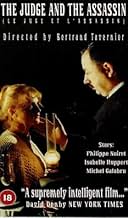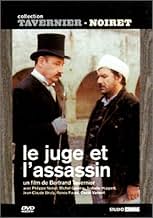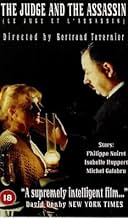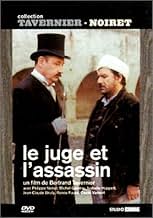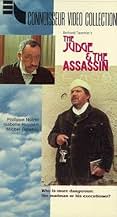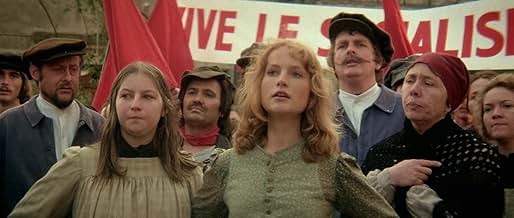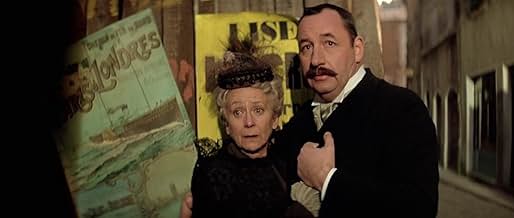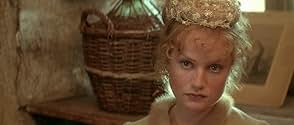IMDb RATING
7.3/10
2.5K
YOUR RATING
An unstable former French Sergeant commits many atrocities. A judge considers how this case could benefit or damage his career.An unstable former French Sergeant commits many atrocities. A judge considers how this case could benefit or damage his career.An unstable former French Sergeant commits many atrocities. A judge considers how this case could benefit or damage his career.
- Awards
- 3 wins & 4 nominations total
Jean-Claude de Goros
- Dr. Dutourd
- (as Jean-Claude de Gorros)
Featured reviews
This stupendous film by Bertrand Tavernier is set against the background of the Dreyfus Affair and the workers' struggles which led to the formation of the Confédération Générale du Travail. Under the spotlight here is the abuse of power by institutions and the inequalities of the justice system.
The two leading protagonists are serial rapist and murderer Joseph Bouvier, based upon real life Joseph Vacher and played to the hilt by Michel Calabru whilst judge Fourquet has here become the unscrupulous Rousseau and is personified by the immaculate Philippe Noiret. His character is not, as an earlier reviewer has suggested, based upon forensic doctor Etienne Lacassagne who is here named Degueldre and is played by Yves Robert.
Bouvier and Rousseau could be said to represent both sides of the same coin. Bouvier is undeniably a monster but is clearly insane(or is he?) whilst Rousseau is in full possession of his faculties and is determined to have Bouvier guillotined in order to further his own ambition, even to the point of cleverly gaining Bouvier's trust so as to extract a full confession.
Ambiguity reigns supreme here and who better to play Rousseau than Noiret whose working relationship with Tavernier, numbering nine films, is a marriage made in heaven. Tavernier not only gifted Noiret challenging roles but wisely gave him free rein in performance. It is understandably Michel Calabru's tour de force as Bouvier that earned him a well-deserved César. His is inspired casting for he was mainly known for his appearances in the popular 'Gendarme' series and there was nothing in his cinematic CV that would suggest he was capable of a performance of this magnitude. His tenure throughout the 1950's with the Comédie Francaise undoubtedly stood him in good stead for this demanding role.
Marvellous support from Jean-Claude Brialy, veteran Renée Faure and moving up the ranks, the twenty-one year old Isabelle Huppert who would again work with Tavernier and Noiret in 'Coup de Torchon' and is here just one year away from her iconic role as 'La Dentelliere'.
We owe Tavernier a debt of thanks for having brought legendary writing duo Jean Aurenche and Pierre Bost in from the cold and as one would expect from exponents of 'cinéma de qualité', their script is beautifully crafted, intelligent and trenchant. Tavernier's unerring sense of place and period and his eye for detail are in evidence here whilst his preferred cinematographer Pierre-William Glenn ensures gorgeous rural images. Inspired score by another of Tavernier's regulars Philippe Sarde with the final song based upon revolutionary tunes from the Commune.
The final caption which points out that although Bouvier's unfortunate young victims numbered twelve, no less than twenty thousand children perished in the mines, serves as a stark reminder of how elusive was the concept of 'Liberté, Egalité, Fraternité'.
The two leading protagonists are serial rapist and murderer Joseph Bouvier, based upon real life Joseph Vacher and played to the hilt by Michel Calabru whilst judge Fourquet has here become the unscrupulous Rousseau and is personified by the immaculate Philippe Noiret. His character is not, as an earlier reviewer has suggested, based upon forensic doctor Etienne Lacassagne who is here named Degueldre and is played by Yves Robert.
Bouvier and Rousseau could be said to represent both sides of the same coin. Bouvier is undeniably a monster but is clearly insane(or is he?) whilst Rousseau is in full possession of his faculties and is determined to have Bouvier guillotined in order to further his own ambition, even to the point of cleverly gaining Bouvier's trust so as to extract a full confession.
Ambiguity reigns supreme here and who better to play Rousseau than Noiret whose working relationship with Tavernier, numbering nine films, is a marriage made in heaven. Tavernier not only gifted Noiret challenging roles but wisely gave him free rein in performance. It is understandably Michel Calabru's tour de force as Bouvier that earned him a well-deserved César. His is inspired casting for he was mainly known for his appearances in the popular 'Gendarme' series and there was nothing in his cinematic CV that would suggest he was capable of a performance of this magnitude. His tenure throughout the 1950's with the Comédie Francaise undoubtedly stood him in good stead for this demanding role.
Marvellous support from Jean-Claude Brialy, veteran Renée Faure and moving up the ranks, the twenty-one year old Isabelle Huppert who would again work with Tavernier and Noiret in 'Coup de Torchon' and is here just one year away from her iconic role as 'La Dentelliere'.
We owe Tavernier a debt of thanks for having brought legendary writing duo Jean Aurenche and Pierre Bost in from the cold and as one would expect from exponents of 'cinéma de qualité', their script is beautifully crafted, intelligent and trenchant. Tavernier's unerring sense of place and period and his eye for detail are in evidence here whilst his preferred cinematographer Pierre-William Glenn ensures gorgeous rural images. Inspired score by another of Tavernier's regulars Philippe Sarde with the final song based upon revolutionary tunes from the Commune.
The final caption which points out that although Bouvier's unfortunate young victims numbered twelve, no less than twenty thousand children perished in the mines, serves as a stark reminder of how elusive was the concept of 'Liberté, Egalité, Fraternité'.
Michel Galabru got the highest french award for his role in this movie, the "Cesar du meilleur acteur". Galabru became then one of the greatest actor in France.
Either in comedy or in tragedy (see "Le gendarme" and "L'été meurtrier".
Either in comedy or in tragedy (see "Le gendarme" and "L'été meurtrier".
A very cursory appraisal of the film would term it as a tale of a true murderer and rapist who killed, raped and sodomized over a dozen shepherd women in rural France before being captured and guillotined. The film is much more than that. The film is more about the respected, educated judges of France who sit in judgement of the evils of less privileged evil-doers, while they are more evil in their actions and scoff at the writings of Emile Zola, that strikes a chord with the average French citizens. One judge is called "Judas" by prisoner who has been tricked, another commits suicide as he reflects on his own past actions that mirror the actions of another. Religion plays a major but discrete role--free lunches for the poor and illiterate are free only if petitions that serve the rich are signed. A judge helps a sibling of an Asian he has condemned to death by ensuring the sibling becomes a Christian and serves him for the rest of his life. Anti-Jewish posters are pasted on outer church walls. Social comments include unwritten restrictions of a Frenchwoman being allowed to marry an Asian. A judge's mother of higher classes, providing cherries in brandy to a lower-class worker but not readily approving her to be the daughter-in-law marked by a silent disapproval when she is brought home. A judge avoids visiting his girlfriend's daughter in hospital but brings flowers for the sick person. The film is less about the "assassin" and more about real life judges and other rich individuals who "judge" the less privileged.
The film is top-notch French cinema, with notable direction and casting, a superb screenplay, good cinematography and fine performances. Tavernier and Noiret made a great team, ever since Tavernier's debut film "The Clockworker of St Paul." It is a pity that this work of Tavernier is rarely discussed and appreciated.
The film is top-notch French cinema, with notable direction and casting, a superb screenplay, good cinematography and fine performances. Tavernier and Noiret made a great team, ever since Tavernier's debut film "The Clockworker of St Paul." It is a pity that this work of Tavernier is rarely discussed and appreciated.
A French provincial town in the late 1890's where a Judge attempts to advance his political power by trying to prove that a soldier was not insane at the time of committing murder, which means soilder gets the guillotine and not the mad house. A movie that is more about the social turmoil in France.
I can't make a real judgment on this film, although the other reviews are rave ones. I just want to add that the story is based on an actual case of the 1890s in France. Joseph Vacher was the real life murderer who is the basis for Michel Galabrue's Joseph Bouvier. Like Vacher he was a former soldier, and he went about the countryside slaughtering young boy shepherds and young girl servants. His destruction of these victims (in terms of mutilations) rivaled his contemporary Jack the Ripper (Vacher was known as Vacher the Ripper). Although he was quite insane the public demanded a death penalty - he was guillotined in 1898. His crimes briefly took public attention off the matter of Captain Alfred Dreyfus.
The Philippe Noiret character is partly based on the noted criminologist Professor Alexander Lacassagne, who (despite considerable evidence of insanity) determined that Vacher was sane, and deserved the death penalty.
The Philippe Noiret character is partly based on the noted criminologist Professor Alexander Lacassagne, who (despite considerable evidence of insanity) determined that Vacher was sane, and deserved the death penalty.
Did you know
- TriviaThis is a fairly straight-forward account of the crimes of Joseph Vacher. "Vacher" and "Bouvier" both mean "cowherd" in French. The names of many of the characters - like Lacassagne - have not been changed.
- GoofsYou can see the shadow of the microphone and the boom moving across the wall of the chapel where the priest is giving his sermon about five minutes after the beginning.
- ConnectionsFeatured in Keskiyön auringon kuvat (1987)
- SoundtracksLa Complainte de Bouvier l'Éventreur
Music by Philippe Sarde
Lyrics by Jean-Roger Caussimon
Performed by Jean-Roger Caussimon
- How long is The Judge and the Assassin?Powered by Alexa
Details
- Runtime
- 2h 8m(128 min)
- Sound mix
- Aspect ratio
- 2.35 : 1
Contribute to this page
Suggest an edit or add missing content

![Watch Bande-annonce [OV]](https://m.media-amazon.com/images/M/MV5BMGRkZTUzMWItY2NmZi00YWFhLTllZTMtZmQzNmFjNmFkY2M5XkEyXkFqcGdeQXRyYW5zY29kZS13b3JrZmxvdw@@._V1_QL75_UX500_CR0)
